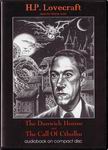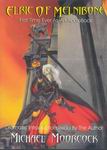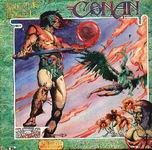

 The Dark Worlds Of H.P. Lovecraft Volume 1: The Dunwich Horror and The Call Of Cthulhu
The Dark Worlds Of H.P. Lovecraft Volume 1: The Dunwich Horror and The Call Of Cthulhu
By H.P. Lovecraft; Read by Wayne June
3 CDs – Approx 3.5 Hours [UNABRIDGED]
Publisher: Audio Realms
Published: 2005
Themes: / Fantasy / Horror / Gods / Evil / Mathematics / Dreams /
The most merciful thing in the world, I think, is the inability of the human mind to correlate all its contents. We live on a placid island of ignorance in the midst of black seas of infinity, and it was not meant that we should voyage far. The sciences, each straining in its own direction, have hitherto harmed us little; but some day the piecing together of dissociated knowledge will open up such terrifying vistas of reality, and of our frightful position therein, that we shall either go mad from the revelation or flee from the light into the peace and safety of a new dark age.
When Fantasy is inspired by science it can be especially powerful. H.P. Lovecraft built his mythos using the scientific concepts of his day. There could have been sensible talk of ‘other dimensions’ before the experiments surrounding the nature of light. And much of the alienness of his creations explicitly depend on such concepts in theoretical physics as non-euclidian geometry. With these concepts being in the air Lovecraft set out to plant a seed of churning fear with his fiction – turning the many unknowns science was uncovering into unspeakable horrors that lurk within the imagination. Combine this with Lovecraft’s dense and brooding prose and you’ve got something that no modern author could get away with. No modern author could, Lovecraft does. Audio Realms is starting to release the titles that make any classic fantasy fan salivate. Here in this terrific audiobook are two tales of horror that we declare to be SFFaudio Essential:
The Dunwich Horror is the tale of a backwater New England town with a devolving populace and one particularly strange family’s chronicle. It starts with two small things. The cataloguing of some mouldering old books and a disturbing birth of a new resident. These events are the begining of a new danger for the hamlet of Dunwich and possibly the Earth entire. What’s interesting here, as with so many early horror tales, is that Lovecraft creates evil not by revealing action directly but by atmosphere and appeal to our primitive revulsion reflex. Lovecraftian evil is not something created by moral degeneracy (though he does talk of that), but rather by sheer alieness, an atmosphere of ignorance and most of all a lurking dread.
I’m not sure it would make much sense to be an apologist for the Elder Gods who’d consume us without a thought – but what exactly makes them so evil? Since everyone who finds out has their sanity blasted we’re not likely to find out very soon.
The Call Of Cthulhu is a reconstructed tale. A nephew finds in the his recently deceased uncle’s study some strange documents. A young nephew discovers in his recently deceased uncle’s study some correspondences and notes, along with a mysterious and disturbing statue. It seems that several mysteriously similar cults worship of a being, who they call Cthulhu. A sea voyage eventually yielded a brush with an unearthly force. I won’t reveal any more of the plot, but I will say this, I think Philip K. Dick may have been inspired by this story for his novel Galactic Pot Healer. This creepy tale is perhaps the definitive Lovecraftian work. They even named a great role playing game after it. One suggestion, this one is pretty scary, you may want to wear brown pants while listening.
Narrator Wayne June’s voice will give you the absolute lurking creeps. His deep raspy voice is also used to good effect for all the narration, when he is infrequently called upon to do the voices of the damned he distinguishes between them well. This is the best Lovecraft adaptation to audio I’ve heard and more frightening than hell. For full effect a listener should turn down the lights, put on a good set of headphones, sit in a lonesome room with a view of the sea and pray that Lovecraft was just making all this stuff up.
Posted by Jesse Willis


